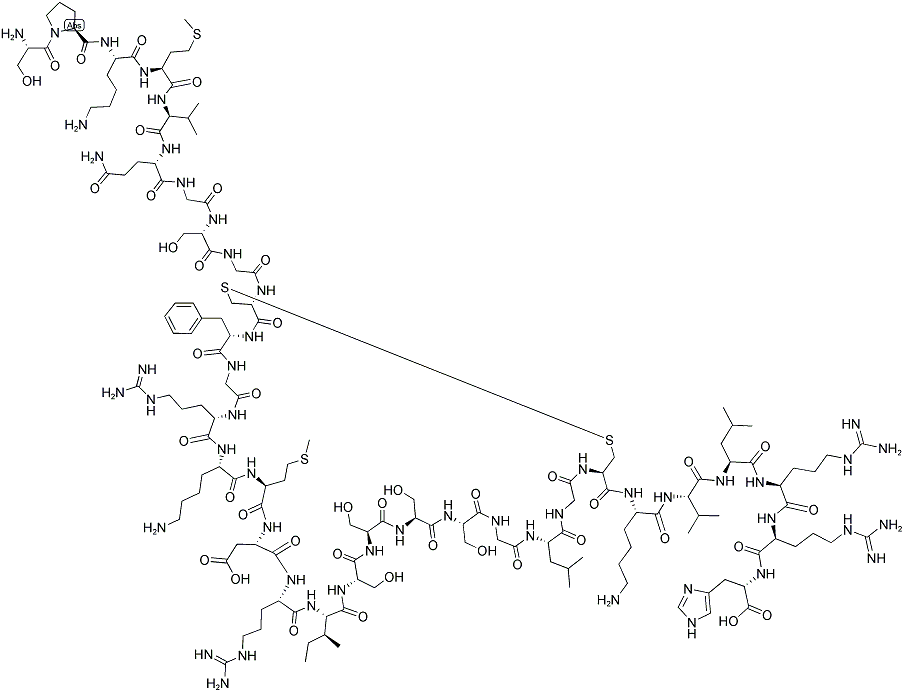Detail introduction: Nesiritide/BNP-32 (HUMAN)/124584-08-3/114471-18-0

| English name | Nesiritide |
| Chinese name | 奈西利肽 |
| CAS NO | 124584-08-3/114471-18-0 |
| Peptide sequence | Ser-Pro-Lys-Met-Val-Gln-Gly-Ser-Gly-Cys-Phe-Gly-Arg-Lys-Met-Asp-Arg-Ile-Ser-Ser-Ser-Ser-Gly-Leu-Gly-Cys-Lys-Val-Leu-Arg-Arg-His(Cys10&Cys26 bridge) |
| Molecular formula | C143H244N50O42S4 |
| Molecular weight | 3464.04 |
| storage temperature | 2-8℃ |
| purity | ≥98% |
| Package | 1mg;5mg;10mg;50mg;100mg,1g or according to customer’s detail requirement. |
| Product English synonyms | BNP-32 (HUMAN)/BRAIN NATRIURETIC PEPTIDE (1-32), HUMAN |
What is Nesiritide?
Nesiritide is a peptide compound composed of 32 peptides, and the domestic similar drug is Xinhuosu. Nesiritide is approved clinically for the treatment of decompensated heart failure. Nesiritide in patients with heart failure can quickly reduce pulmonary capillary wedge pressure, pulmonary artery pressure, right atrial pressure, and systemic resistance reduce mitral regurgitation, improve subendocardial blood perfusion, and reflexly dilate blood vessels to increase the heart Output, improve clinical symptoms.
Which patients is Nesiritide suitable for?
Clinical manifestations such as decompensated heart failure, heart function grade IV (NYHA grade), dyspnea at rest or light activity, or fluid retention. Decompensated heart failure is manifested by hypoperfusion of the systemic circulation (hypotension, clammy limbs, small pressure difference, lethargy, elevated blood urea nitrogen and creatinine, and hyponatremia) and congestion of the body and pulmonary circulation (oriental breathing, Paroxysmal nocturnal dyspnea, jugular vein filling, ascites, edema, tenderness in the liver area, positive hepatic jugular reflux sign, pulmonary rales).
Side effects of Nesiritide
The incidence of headache in patients who used Nesiritide was 8%, which was much lower than the 20% in the nitroglycerin group. In these two drugs, the incidence of asymptomatic hypotension was 8%, and the incidence of symptomatic hypotension was 4% in Nesiritide and 5% in the nitroglycerin group.
Excessive diuresis in patients who usually use Nesiritide is the main factor leading to hypotension, so the use of Nesiritide diuretics should be reduced. Nesiritide does not worsen arrhythmia and angina pectoris, nor does it produce toxic metabolites, and no drug resistance and allergies have been observed.
For most patients with decompensated heart failure, the combined application of vasodilators and appropriate diuretics can effectively treat water and sodium overload, inhibit the activation of the RAAS system, and improve subendocardial ischemia. However, practice shows that when decompensated heart failure or decompensated heart failure does not respond to conventional treatment, Nesiritide can be used as a first-line synthetic peptide drug to improve hemodynamics and symptoms.
How to buy Nesiritide in the U. S.
Remetide Peptide Supplier specializes in the production and sales of peptides in the USA, as well as Professional Drug peptide R&D. Feel free to contact us if you have any questions or inquiries about Peptides.

